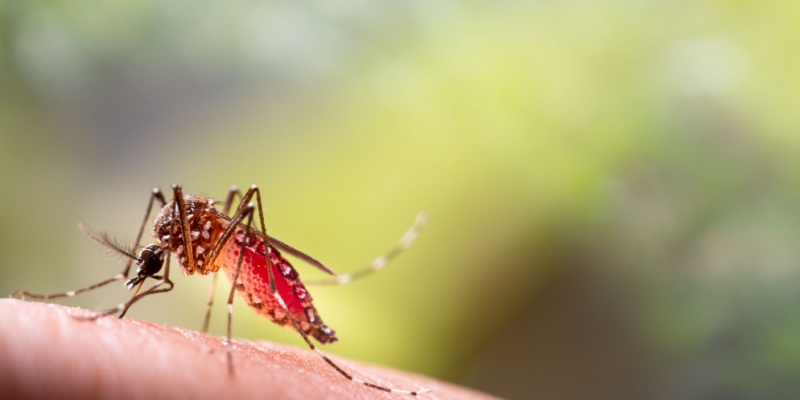Mosquito -Borne Diseases What You Need to Know in Indiana
While mosquitoes are primarily known as annoying backyard pests that disrupt outdoor activities, they also pose serious health risks as vectors for disease. Indiana residents should be aware of the potential threats these insects carry and take appropriate precautions. At Trio Pest Control, we believe that understanding these risks is the first step toward effective protection.
West Nile Virus: Indiana's Primary Concern
West Nile Virus (WNV) represents the most significant mosquito-borne disease threat in Indiana. First detected in the state in 2001, it has become established throughout Indiana with cases reported annually.
Key facts about West Nile Virus in Indiana:
- Primarily transmitted by Culex mosquitoes, which breed in standing water and are most active at dawn and dusk
- Most human infections (about 80%) produce no symptoms
- Approximately 20% of infected people develop West Nile fever, with symptoms including:
- Fever
- Headache
- Body aches
- Joint pain
- Vomiting
- Diarrhea
- Rash
- Less than 1% develop severe neuroinvasive disease, which can cause:
- Encephalitis (brain inflammation)
- Meningitis (inflammation of the membranes surrounding the brain and spinal cord)
- Poliomyelitis-like syndromes
- Potential long-term neurological effects
The Indiana State Department of Health conducts surveillance for WNV in mosquitoes, birds, horses, and humans throughout the mosquito season. Each year, Indiana typically reports between 10-40 human cases, though many mild cases likely go undiagnosed.
La Crosse Encephalitis
Though less common than West Nile Virus, La Crosse Encephalitis (LACE) occurs sporadically in Indiana, particularly in heavily wooded areas.
Key facts about La Crosse Encephalitis:
- Transmitted primarily by the Eastern treehole mosquito (Aedes triseriatus)
- Most cases occur in children under 16 years of age
- Symptoms range from mild fever to severe encephalitis
- Most patients recover fully, but some experience lingering neurological effects
- Prevention focuses on eliminating water-filled containers and treeholes where these mosquitoes breed
Eastern Equine Encephalitis
Eastern Equine Encephalitis (EEE) is rare in Indiana but extremely serious when it occurs. The disease primarily affects horses but can infect humans.
Key facts about Eastern Equine Encephalitis:
- Transmitted by mosquitoes that breed in freshwater swamps
- One of the most severe mosquito-borne diseases, with a 30-50% mortality rate
- Many survivors experience permanent neurological damage
- Symptoms include sudden fever, headache, vomiting, progressing to disorientation, seizures, and coma
- Indiana occasionally reports cases in horses, with human cases being extremely rare
Emerging Threats and Climate Considerations
Climate change and globalization create potential for expanded mosquito-borne disease risk in Indiana:
Dengue, Zika, and Chikungunya:
- Currently rare to nonexistent in Indiana
- Transmitted by Aedes mosquitoes, particularly the Asian tiger mosquito, which is established in southern Indiana
- Increasing temperatures could expand suitable habitat for vector mosquitoes
- International travel increases potential for introductions
Heartworm Disease:
- While not a human health concern, mosquitoes transmit heartworm to dogs and cats
- Prevention through veterinarian-prescribed medications is essential for pets
Risk Factors for Mosquito-Borne Diseases
Certain factors increase your risk of exposure to mosquito-borne diseases in Indiana:
- Location: Living near standing water, wetlands, or wooded areas
- Housing: Inadequate screens or outdoor sleeping arrangements
- Time of day: Outdoor activity during peak mosquito feeding times
- Clothing: Exposed skin increases biting opportunities
- Season: Late summer through early fall typically sees highest infection rates
- Weather patterns: Wet springs followed by hot summers often lead to increased mosquito activity
Prevention Strategies
To protect yourself and your family from mosquito-borne diseases:
- Use effective repellents containing DEET, picaridin, IR3535, or oil of lemon eucalyptus
- Wear protective clothing when outdoors during peak mosquito activity
- Eliminate breeding sites by removing standing water around your property
- Maintain window and door screens to keep mosquitoes out of your home
- Consider timing outdoor activities to avoid peak mosquito feeding times
- Support community mosquito control efforts in your area
Professional Mosquito Management
For comprehensive protection, professional mosquito control offers significant advantages:
- Identification and treatment of breeding sites that homeowners might miss
- Application of effective, targeted control methods
- Long-lasting protection throughout the mosquito season
- Integrated approach that addresses all life stages of mosquitoes
At Trio Pest Control, our mosquito management programs include thorough property assessment, targeted treatments, and ongoing monitoring to dramatically reduce mosquito populations around your home. Our approach not only makes your outdoor spaces more comfortable but also reduces the risk of mosquito-borne diseases.
Contact Trio Pest Control today to learn how our mosquito control services can protect your family in Indianapolis and surrounding communities.
